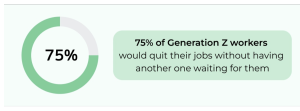So, you’ve scoured the country, hunting for the best and brightest talent.
You’ve interviewed those who you think are the best of the best.
You’ve tested them, and they’ve passed with flying colors.
Maybe you’ve even introduced them to who their manager might be.
The candidate you picked says yes (great!)…
But then everything starts to unravel.
It’s barely a few weeks (sometimes even days), before your great new hire is about to start. And suddenly they message you to say they’re pulling out.
No real apology for wasting everyone’s time; just that they’ve found a better job elsewhere.
That’s it.
And yes, that means months of time and effort and anticipation about a great new relationship has all gone down the proverbial drain.
Candidates are increasingly calling it quits – before they even start!
If this scenario is one that feels chillingly familiar, you are not alone.
New research published by Gartner reveals a trend that was already starting to gather pace is now getting even worse – the practice of people accepting a job offer, but then backing out before they were actually due to start.
And it’s an enervating experience for CHROs to have to accept.
“Even before Covid-19, we were collecting data indicating candidates were becoming far less loyal to companies even before joining them,” says Jamie Kohn, senior research director in Its Human Resources Practice, talking exclusively to TLNT.
“Back then we asked people if they’d ever accepted a job, but then pulled out. Some 36% of people we questioned said yes in 2019, and 44% said yes in 2022.”
She adds: “But this year we asked is anyone had pulled out of joining a company after accepting an offer within the last year, and were staggered to find that the percentage had jumped to 50% of candidates.”
Keeping their options open
The research, which questioned more than 3,500 people over the summer, revealed that people were accepting roles but still very much keeping their options open, by continuing to apply and attend interviews for others.
Amongst nearly 2,000 candidates who were found to have recently accepted an offer, a whopping 47% said they were still open to other job offers after accepting a position, while 42% believed they could still find a better job if they carried on looking.
And according to Kohn it’s an infuriating situation for CHROs to have to deal with – lack of loyalty even before they start.
“The data shows 51% of leaders said they were seeing a decline in commitment to offers, and it’s starting to become a real problem.”
Looking after number one
According to Kohn, the rise of this phenomenon goes hand-in-hand with a parallel trend for distrusting organizations in general.
“This is now extending to the hiring process,” she says. “Candidates are saying to themselves ‘If a company isn’t prepared to look after my interests, why should I look out for them?’”
Is there anything HR professionals can do?
“We are seeing many candidates uncommitted to their new employer and keeping one foot in the job market.”
According to Kohn, candidates are almost applying the same rules to companies as they might for online dating – having a ‘date’ (ie job) lined up, but also having a few others in reserve as well.
But she also says that companies can also learn these rules themselves, and try to manage the odds better in their favor – chief amongst which is opening up better lines of pre-employment communication.
“If we take this dating analogy further, what we find is that many companies aren’t actually talking to the candidate until the day of the date [ie the day they are due to join the company] – so in this sense, it’s easy to see why candidates wonder why they should invested in that company.”
She argues a proper relationship needs cultivating straight away. “There are definitely things HR can be doing to try and strengthen pre-joining commitment levels,” she says.
“One of the big things the data finds is that commitment rises when a company’s own hiring manager reaches out to them first, rather than an outside recruiter. It shows candidates that the organization itself is interested in them.”
She adds: “CHROs have to look at things from the candidates’ perspective. Without this early outreach, it can be easy to see why a candidate might think the business isn’t interested in them.”
Other elements that make a difference are largely hygiene ones that still aren’t always remembered.
Sixty-eight percent of candidates said they expect to see salary information in job postings; 64% of candidates reported they are more likely to apply to a job that lists compensation in the description. Some 59% of respondents also said they chose the offer they accepted in part due to knowing there was flexibility in when or where they worked. Finally, other top drivers cited by candidates for accepting a new job offer were better work-life balance (45%) and higher compensation (40%).
Creating the right balance
The key, argues Kohn is creating the right balance of some pre-job contact, but not too much that they’ll be frightened away. “HR doesn’t want to overwhelm people, but at the same time, the candidate wants to know they’ve made the right choice.”
She adds: “A particular problem is long notice periods, where these lengthen the time it takes for people to join and organization – and therefore increase the opportunity/likelihood that a drop out will happen.”
But this is where she says contact is vital: “It’s also better if this comes from as wide a range of people as possible, such as the new joinee’s new manager, or that manager’s direct report – as this will help people feel more welcome.”
Is this just a blip though?
One big question remains however: whether the attitudes revealed by Gartner simply reflect the fact that it’s job seekers that currently wield all the power right now – power that might soon wane if new openings dry up, and there is risk of not being able to find another role quite so easily.
“It’s an interesting question,” reflect Kohn.
“There’s no doubt candidates rule at the moment. They’re coming to the table with multiple offers on the table, and so they can afford to be picky and drop out just like that – even if they’ve accepted a role.”
She adds: “So if the market cools…? It’s a difficult one the answer. My feeling is that maybe they’ll take the job this time – and not pull out – but then they’ll probably still quit in a few months anyway – which might make matters even worse.”
She says: “At least if they drop out before they’re due to start, the company can find someone that ‘really’ wants the job.”
Kohn adds: “What I do think though, is that employers can’t rely on a harder job market rescuing them. They need to change. Even if the market does cool, job seekers are till backing up their desire to pull out if things don’t sit right for them.”
Perhaps it’s not all so bad?
Of course, the silver lining to all of this could be that nobody really wants to hire someone who was never that serious about the job anyway, and that it’s far better to get the ‘right’ person – even if someone pulling out does hurt at the time.
“The earlier someone backs out, the better,” agrees Kohn.
“Otherwise, companies are just recruiting people that will leave further down the line. Giving people the opportunity to say that actually, a job isn’t for them, is OK. But what organizations do need to try and redress are the reasons people drop out in the first place – some of which are in their control.”
She concludes: “We are certainly seeing recruitment teams having to engage with greater numbers of people, just to find the right person – which is time and cost-intensive.”
She adds: “Companies that are very clear about who they are and what they can offer are the ones that will, and do, see less people backing out once they accept a job offer.”
What the data says:
According to ResumeLab’s just-published latest research into Gen Z, it found:
* 83% of Gen Z workers consider themselves job hoppers

* 75% of Generation Z workers would quit their jobs without having another one

